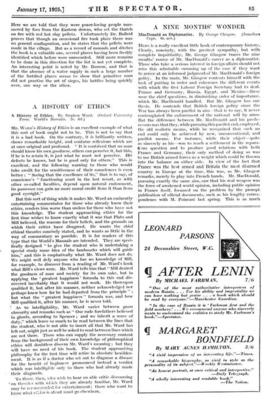A HISTORY OF ETHICS
Mn. WARD'S History of Ethics is an excellent example of what this sort of book ought not to be. This is not to say that it is a bad book. On the contrary, it is brilliantly written, shows remarkable insight, and contains reflexions which arc at once original and profound. " It is contrived that no man should know his own goodness, others can perceive it, but this, if he is to retain it, is just what he must not perceive. His defects he knows, but he is good only for others." This is excellent, and the following warning to those who would take credit for the sensitiveness of their consciences is even better : " Seeing that the excellence of its," that is to say, of conscience's " functioning must in the last resort, as with other so-called faculties, depend upon natural endowment, its possessor can gain no more moral credit from it than from good eyesight."
But this sort of thing while it makes Mr. Ward an eminently entertaining commentator for those who already know their ethics, renders him worse than useless for those who have not this knowledge. The student approaching ethics for the first time wishes to know exactly what it was that Plato and Mill believed, the reasons for their beliefs, and the grounds on which their critics have disagreed. He wants the chief ethical theories concisely stated, and he wants as little in the way of commentary as possible. It is for readers of this type that the World's Manuals are intended. They are speci- fically designed " to give the student who is undertaking a special study some idea of the landmarks which will guide him," and this is emphatically what Mr. Ward does not do. We might well defy anyone who has no knowledge of Mill, for example, to discover from a reading of Mr. Ward's book what Mill's views were. Mr. Ward tells him that "Mill desired the goodness of man and society for its own sake, but in applying the ' greatest happiness' formula to this end dis- covered inevitably that it would not work. He thereupon qualified it, but after his manner, neither acknowledged nor perhaps knew how far lie had departed from the principle " ; but what the " greatest happiness " formula was, and how Mill qualified it, after his manner, he is never told.
1. As to intelligibility, Mr. Ward varies between gross obscurity and remarks such as " Our rude forefathers believed in ghosts, according to Spencer ; and we inherit a sense of duty," which leave so much to be read between the lines that the student, who is not able to insert all that Mr. Ward has left out, might just as well be asked to read between lines which are not there. Those who can supply the necessary content from the background of their own knowledge of philosophical ethics will doubtless discern Mr. Ward's meaning ; but they will have no need of his book. The student approaching philosophy for the first time will retire in absolute bewilder- ment. It is as if a doctor who set out to diagnose a disease for the benefit of beginners pronounced instead a verdict which was intelligible only to those who had already made their diagnosis.
To those, then, who wish to hear an able critic discoursing ` on them ies with which they are already familiar, Mr. Ward may be nu:mended for entertainment ; those who want to know what el Lizs is about must go elsewhere.










































 Previous page
Previous page